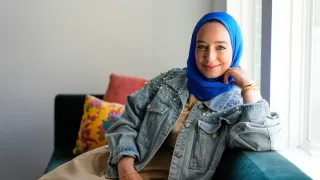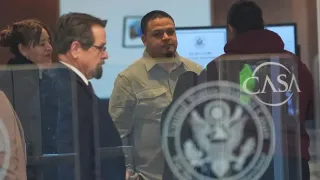August 16, 2024
Elliot Page's Raw and Vulnerable Performance Anchors Trans Film 'Close to You'
Megan Kearns READ TIME: 4 MIN.
For some LGBTQ+ people, moving to a city can be vital for us to find community and fully be ourselves. Returning home might be fraught with painful memories and unresolved relationships. Running into your first love can be overwhelming. Indie film "Close to You" sensitively explores all of these themes.
Actor, writer, and producer Elliot Page stars as Sam, a queer trans man living in Toronto who reluctantly returns to his small hometown to visit his family for his father's birthday. On the trip, he reconnects with his old friend, Katherine (Hillary Baack). Written and directed by Dominc Savage, with a story by Savage and Page, it's a fairly straightforward premise that excavates poignant emotional depths.
Page gives a raw, vulnerable, and personal performance. I've always liked his acting ("Juno," "Whip It," "Inception") and directing (documentary "There's Something in the Water"), but this performance goes deeper, feeling more emotional.
The film opens with Sam waking up and gazing out the window shirtless. We see his bare chest in full view, his top surgery scars visible. It's not filmed in a salacious way, but rather as a declaration: "This is me, here I am."
At breakfast with his roommate, Sam shares his apprehension about returning home. He hasn't seen his family in four years. While they accept him being trans, he heartbreakingly says he's "a disappointment" to them.
On the train, Sam sees his best friend from high school, Katherine. Both are surprised and delighted, as they haven't seen each other in 20 years. Sam smiles and says "a lot of changes" occurred in his life, referring to his transition. Katherine compliments him, saying he looks really good. Still living in their hometown, she's now married with two children. Holding hands, sitting across from each other, their conversation is eager and joyous, yet tentative, the way it feels initially reconnecting with someone special from your past. Their interactions hint at something deeper than friendship.
Arriving at his family's house, Sam's parents and siblings warmly welcome him. They take a family photo, and everyone is clearly happy to see him, but a sense of awkwardness lingers.
Sam talks to one of his sisters, who is upset that he hasn't been around. He explains how he needed space. His sister worries since he rents a room in a friend's house, but Sam says, "You weren't worrying about me when I was actually not okay. So here I am. I'm feeling good... I'm living my life." As they talk further, Sam cries, sharing how hard it is to return home when you "didn't feel seen."
In another scene, Sam and his mother talk. She offers financial help and asks about his life. Sam says he loves the city and his job, and he meets lots of queer and trans people. He says he's happy for "the first time." Sam's mother berates herself for accidentally misgendering him, causing Sam to console her. Thankfully, his mother tells him that he's brave for living his life, and that she's proud of him.
Sam's father reassures him that he's "always welcome here," and shares how horrible it was to see Sam depressed and miserable before he transitioned. When Sam called home, his father says, he "sounded so happy," which was one of the "happiest moments" of his life. The camera remains on Sam in a close-up; we see Sam smile upon hearing his father's supportive words.
The only unsupportive, unwelcoming person is Sam's brother-in-law, Paul. An aggressive bigot, he repeatedly gives Sam attitude and makes oblique transphobic comments; matters eventually build to a confrontation.
Away from the family drama, walking on a beach, Sam and Katherine revel in each other's company. They share how safe and comfortable they felt with each other, how they could be themselves, a spark still flickering between them. Amidst the setting sun's golden glow, the camera lullingly moves back and forth between them, mirroring the sound of waves.
An effortless ease and emotional intimacy exists between Sam and Katherine, facilitated by Elliot Page and Hillary Baack's real-life friendship and from their having worked together before. Their beautiful scenes together (my favorites in the film) brim with tenderness, and continually brought me to tears.
Writer/director Dominic Savage says in the film's press notes that he writes roles for specific actors and makes films "collaboratively" with them. Elliot Page said the dialogue was entirely improvised. While one of the first scenes feels a bit stilted, with lots of exposition, I never would have known merely by watching, as the rest of the dialogue flows organically and authentically.
It's been incredible to witness Page's transition as he openly shares his journey as a trans person in his book "Pageboy," in interviews, and on social media, while advocating for the rights of trans kids and trans people of color.
Page's emotional, candid, and tender performance anchors "Close to You," a beautiful and poignant trans film that conveys the urgency of self-acceptance and the importance being truly yourself.
"Close to You" opens in theaters on August 16, 2024.






